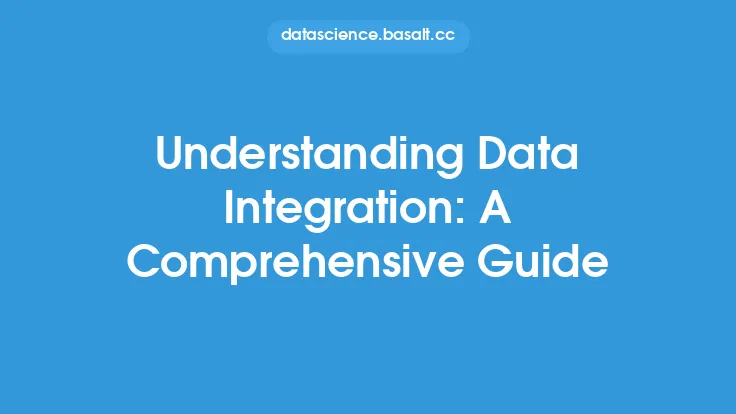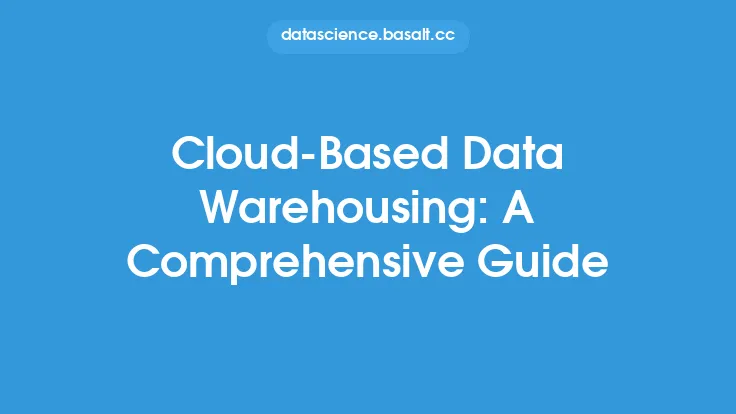Data management is a critical component of any organization's overall data governance strategy. It involves the process of collecting, storing, organizing, and maintaining data in a way that ensures its accuracy, completeness, and reliability. Effective data management is essential for making informed business decisions, improving operational efficiency, and reducing costs. In this article, we will delve into the world of data management, exploring its key concepts, principles, and best practices.
Introduction to Data Management
Data management is a broad term that encompasses a range of activities, including data collection, data storage, data processing, and data analysis. It involves the use of various tools, technologies, and techniques to manage the entire data lifecycle, from creation to disposal. The goal of data management is to ensure that data is accurate, complete, and consistent, and that it is available to authorized users in a timely and efficient manner. Data management is a critical function that supports business decision-making, risk management, and compliance with regulatory requirements.
Key Concepts in Data Management
There are several key concepts that are essential to understanding data management. These include:
- Data governance: This refers to the overall management framework that ensures data is managed in a way that meets organizational needs and complies with regulatory requirements.
- Data quality: This refers to the accuracy, completeness, and consistency of data, as well as its relevance and timeliness.
- Data security: This refers to the measures taken to protect data from unauthorized access, use, or disclosure.
- Data storage: This refers to the physical or virtual infrastructure used to store data, such as databases, data warehouses, or cloud storage.
- Data processing: This refers to the activities involved in transforming raw data into meaningful information, such as data mining, data analytics, or business intelligence.
Data Management Principles
There are several principles that guide effective data management. These include:
- Data should be managed as a strategic asset: This means that data should be treated as a valuable resource that supports business decision-making and drives organizational success.
- Data should be accurate, complete, and consistent: This means that data should be of high quality, and that it should be managed in a way that ensures its accuracy, completeness, and consistency.
- Data should be secure: This means that data should be protected from unauthorized access, use, or disclosure, and that measures should be taken to prevent data breaches or other security incidents.
- Data should be accessible: This means that data should be available to authorized users in a timely and efficient manner, and that it should be managed in a way that supports business decision-making and operational efficiency.
Data Management Best Practices
There are several best practices that can help organizations manage their data effectively. These include:
- Develop a data management strategy: This involves defining the organization's data management goals, objectives, and policies, as well as identifying the resources and infrastructure needed to support data management.
- Establish data governance: This involves defining the roles, responsibilities, and accountabilities for data management, as well as establishing policies and procedures for data management.
- Implement data quality controls: This involves establishing processes and procedures for ensuring data accuracy, completeness, and consistency, such as data validation, data cleansing, and data normalization.
- Use data management tools and technologies: This involves using tools and technologies such as databases, data warehouses, and business intelligence software to support data management.
Data Management Tools and Technologies
There are a range of tools and technologies that can be used to support data management. These include:
- Databases: These are software systems that store, manage, and provide access to data, such as relational databases, NoSQL databases, or cloud databases.
- Data warehouses: These are centralized repositories that store data from various sources, and that provide a single, unified view of organizational data.
- Business intelligence software: This includes tools and technologies such as data analytics, data mining, and reporting software, which are used to transform raw data into meaningful information.
- Cloud storage: This involves storing data in a cloud-based infrastructure, such as Amazon S3, Microsoft Azure, or Google Cloud Storage.
Data Management Challenges
There are several challenges that organizations may face when managing their data. These include:
- Data volume: This refers to the large amounts of data that organizations generate and collect, which can be difficult to manage and analyze.
- Data variety: This refers to the different types and formats of data that organizations collect, which can be difficult to integrate and analyze.
- Data velocity: This refers to the speed at which data is generated and collected, which can be difficult to manage and analyze in real-time.
- Data security: This refers to the risk of data breaches or other security incidents, which can compromise the confidentiality, integrity, and availability of data.
Conclusion
Data management is a critical component of any organization's overall data governance strategy. It involves the process of collecting, storing, organizing, and maintaining data in a way that ensures its accuracy, completeness, and reliability. By understanding the key concepts, principles, and best practices of data management, organizations can develop effective data management strategies that support business decision-making, improve operational efficiency, and reduce costs. Whether you are a data professional, a business leader, or an IT specialist, mastering data management is essential for success in today's data-driven world.





